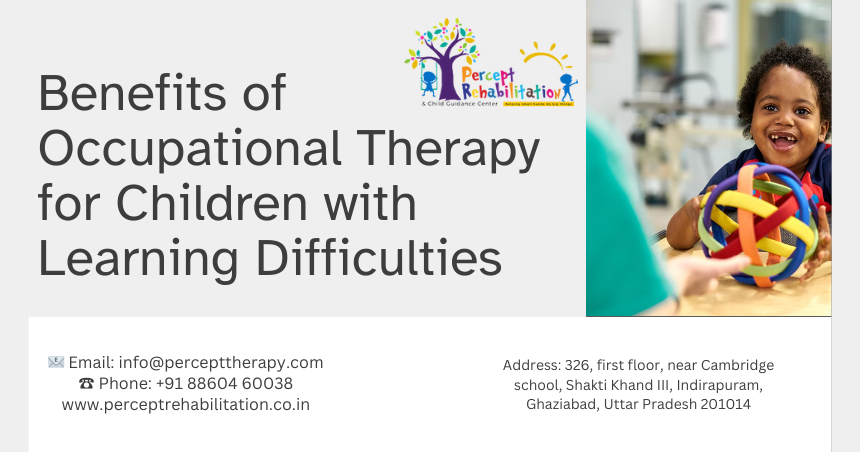When children show signs of delay in communication, movement, social interaction, or adaptive behavior, early action makes a difference. An occupational therapist in Indirapuram often works with families who come after long periods of waiting—months, sometimes years—hoping things would improve with time. But milestones are more than just age-based checklists; they are indicators of how the brain and body are progressing. Ignoring delays or postponing evaluations can reduce a child’s chances for optimal development.
Development Doesn’t Follow a Fixed Timeline—But Patterns Matter
Children develop at their own pace, but there are typical patterns to watch. Delays in sitting, crawling, walking, babbling, pointing, or engaging with peers are not always harmless. Professionals look not just at whether a child has achieved a skill, but also how they achieved it and when.
For instance, a toddler who walks at 18 months might be fine. But if that same toddler also doesn’t respond to name calls, struggles with finger feeding, or avoids eye contact, it may signal broader concerns.
Postponing a developmental evaluation may seem like giving a child time to catch up. In reality, it often creates missed windows of early support.
Common Reasons Parents Delay—and Why They Shouldn’t
Parents often hold back due to emotional, cultural, or logistical reasons. Some of the most common include:
- “Every child grows differently.”
- “Let’s wait and see for another few months.”
- “My older child was the same and turned out fine.”
- “Family says I’m worrying too much.”
- “I don’t want my child to be labeled.”
While these feelings are valid, delays are better addressed than ignored. Acting early doesn’t mean labeling—it means supporting.
The Critical Early Years of Brain Development
Between birth and age five, a child’s brain forms more connections than at any other time. This plasticity makes the early years ideal for intervention. A child who receives support early may require far less assistance later in life, or none at all.
Waiting can reduce responsiveness to therapy. Neural circuits begin pruning unused connections by age five, making later intervention more complex and often slower in effectiveness.
Red Flags That Warrant Immediate Attention
Waiting should never be an option when clear signs of delay are present. Some indicators that should prompt an immediate developmental evaluation include:
- No babbling by 12 months
- No gestures (pointing, waving) by 12 months
- No single words by 16 months
- No two-word phrases by 24 months
- Any loss of previously acquired speech or skills
- Avoidance of eye contact or limited interest in social interaction
- Poor motor coordination or excessive clumsiness
- Unusual sensory responses (avoiding touch, excessive spinning, etc.)
These signs don’t confirm a condition, but they warrant assessment.
The Role of Occupational Therapy in Early Development
An occupational therapist in Indirapuram can assess various areas such as fine motor skills, sensory processing, coordination, self-care abilities, and social engagement.
Therapists don’t just focus on “hand skills.” They work holistically—looking at how children play, eat, move, respond to surroundings, and engage with people. Early sessions may include:
- Activities to improve muscle strength and coordination
- Games to stimulate sensory processing
- Parent coaching for better home routines
- Techniques for feeding challenges
- Social play strategies to enhance peer interaction
The earlier the intervention, the more integrated these skills become into the child’s day-to-day functioning.
Benefits of Getting a Developmental Evaluation Early
Delaying support can impact the child’s learning, peer relationships, confidence, and mental health. On the other hand, early evaluations lead to:
- Targeted intervention plans tailored to your child’s needs
- More effective therapy results when the brain is most adaptable
- Better school readiness, both academically and socially
- Reduced parental anxiety through clarity and action steps
- Improved family dynamics by reducing behavioral stressors
Even when no significant issue is found, an evaluation offers peace of mind or preventive suggestions to boost development.
Myths That Stop Parents from Acting Early
Despite widespread access to information, myths persist. These contribute to delays in evaluation and care. Here’s why they’re unhelpful:
| Myth | Truth |
|---|---|
| “Boys talk late.” | Gender can’t justify delays in key milestones. |
| “Second kids take longer.” | Birth order doesn’t affect developmental norms. |
| “They’re just shy.” | Social withdrawal may be more than temperament. |
| “Therapy is only for severe cases.” | Early support works best when concerns are subtle. |
| “It’ll sort itself out.” | Developmental issues rarely resolve without guidance. |
What does a Developmental Evaluation include?
Evaluations aren’t invasive or stressful for the child. They’re often play-based, observational, and involve parent input. A typical assessment includes:
- Review of developmental history
- Interaction-based testing with toys and tasks
- Observations of movement, communication, and behavior
- Feedback sessions with parents
- Referral to specialists if needed (speech, OT, etc.)
Even when conducted by an occupational therapist in Indirapuram, evaluations may also involve a team including psychologists, pediatricians, or speech-language pathologists.
How Delays Affect Long-Term Outcomes?
Untreated delays can have cascading effects:
- Speech delay may impact literacy and classroom participation.
- Poor motor skills may reduce confidence and lead to exclusion from play.
- Sensory challenges may cause anxiety or disruptive behavior.
- Social skill deficits can hinder friendships and peer learning.
These consequences are preventable when identified and addressed early.
Parents’ Role in the Evaluation and Intervention Process
Parental insight is essential during assessments. Observations about daily routines, reactions to stimuli, feeding habits, and social behaviors shape the evaluation.
Once therapy begins, progress is strongest when parents:
- Participate in sessions
- Follow home strategies consistently
- Maintain communication with professionals
- Track improvements and share concerns regularly
Support is most effective when it’s not limited to therapy rooms—it must extend into the home.
When Schools or Daycares Suggest Evaluation
Sometimes, caregivers are the first to notice signs. If your child’s teacher or daycare provider raises concerns, take them seriously. They see a wide range of children and often pick up patterns early.
Don’t dismiss such observations as overreactions. Use them as motivation to schedule an evaluation.
Emotional Hurdles: What Parents Feel and How to Cope
Receiving a suggestion for evaluation can bring discomfort. Parents may feel guilt, denial, shame, or fear of judgment. These feelings are common but temporary.
Support groups, therapists, or peer parents can help. Reframing the situation as “support” rather than “problem-solving” eases emotional stress. Every parent wants the best for their child, and taking action reflects courage, not failure.
When Evaluation Leads to a Diagnosis
Sometimes evaluations reveal a diagnosis like autism spectrum disorder, global developmental delay, or sensory processing disorder. This can feel overwhelming.
However, a diagnosis provides clarity, not a limit. It opens doors to funding, tailored education, and specialized therapies. Early identification allows children to grow into their strengths and manage challenges before they escalate.
How to Get a Developmental Evaluation?
Parents can begin with:
- Speaking to a pediatrician – Request a formal screening or referral.
- Connecting with an occupational therapist in Indirapuram – Many clinics offer direct evaluations.
- Contacting early intervention programs – These often provide free or subsidized assessments for children under 6.
- Asking for help from schools or daycares – Especially if the child is already in a structured environment.
Evaluations are not tests a child can fail—they’re snapshots of where support might help.
Signs You Should Book an Evaluation Without Delay
Here’s a quick list for unsure parents:
- Your child misses more than one major milestone
- Family members express concerns
- Daycare providers notice behavioral challenges
- You feel “something isn’t right”
- Your child avoids touch, sound, or eye contact
- Motor skills seem behind compared to peers
Waiting often leads to more confusion. Scheduling an evaluation brings answers.
Why Acting Now is the Right Step?
Every week counts. Postponing developmental evaluations may affect not just skills but a child’s self-image, curiosity, and relationships. Early support lays a foundation for lifelong learning and emotional health.
An occupational therapist in Indirapuram can help identify areas that need nurturing, build strategies around them, and empower families to move forward with clarity and hope.
Delays aren’t faults—they’re signals. Ignoring them silences the child’s needs. Responding early gives them the voice they deserve.



